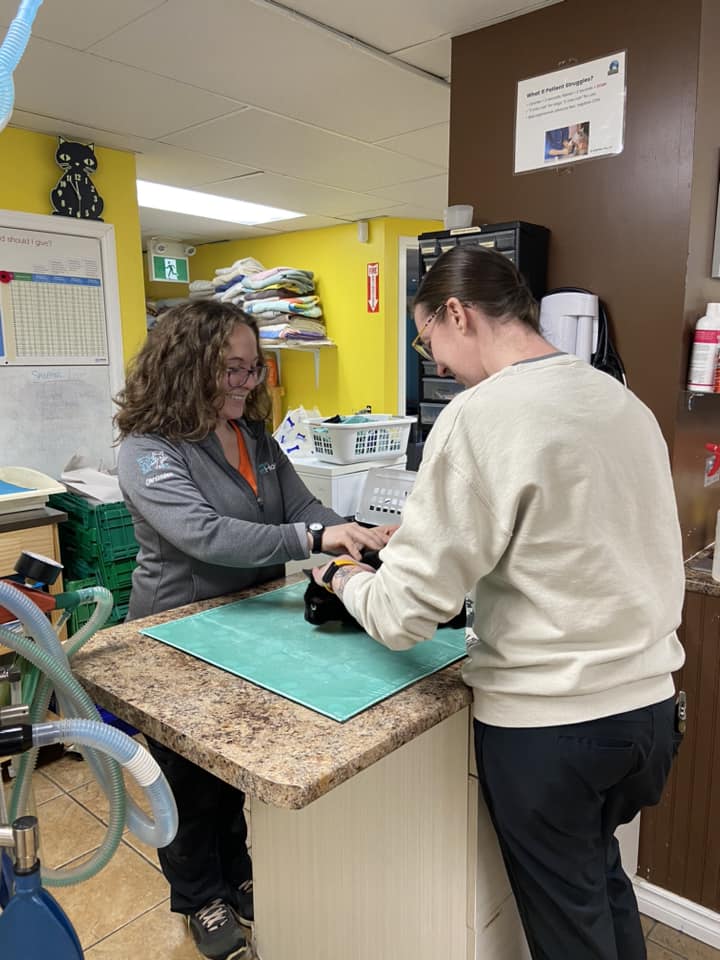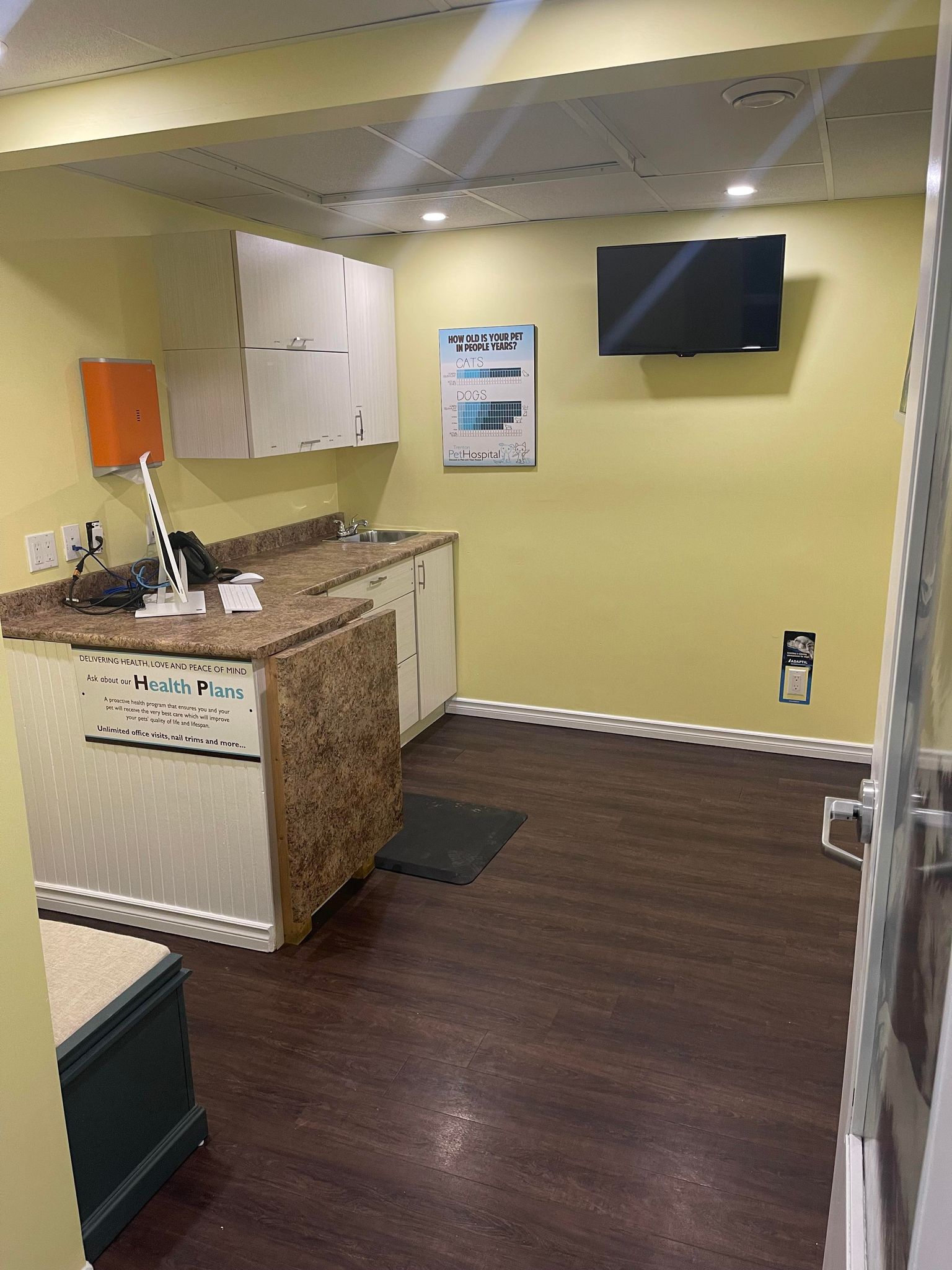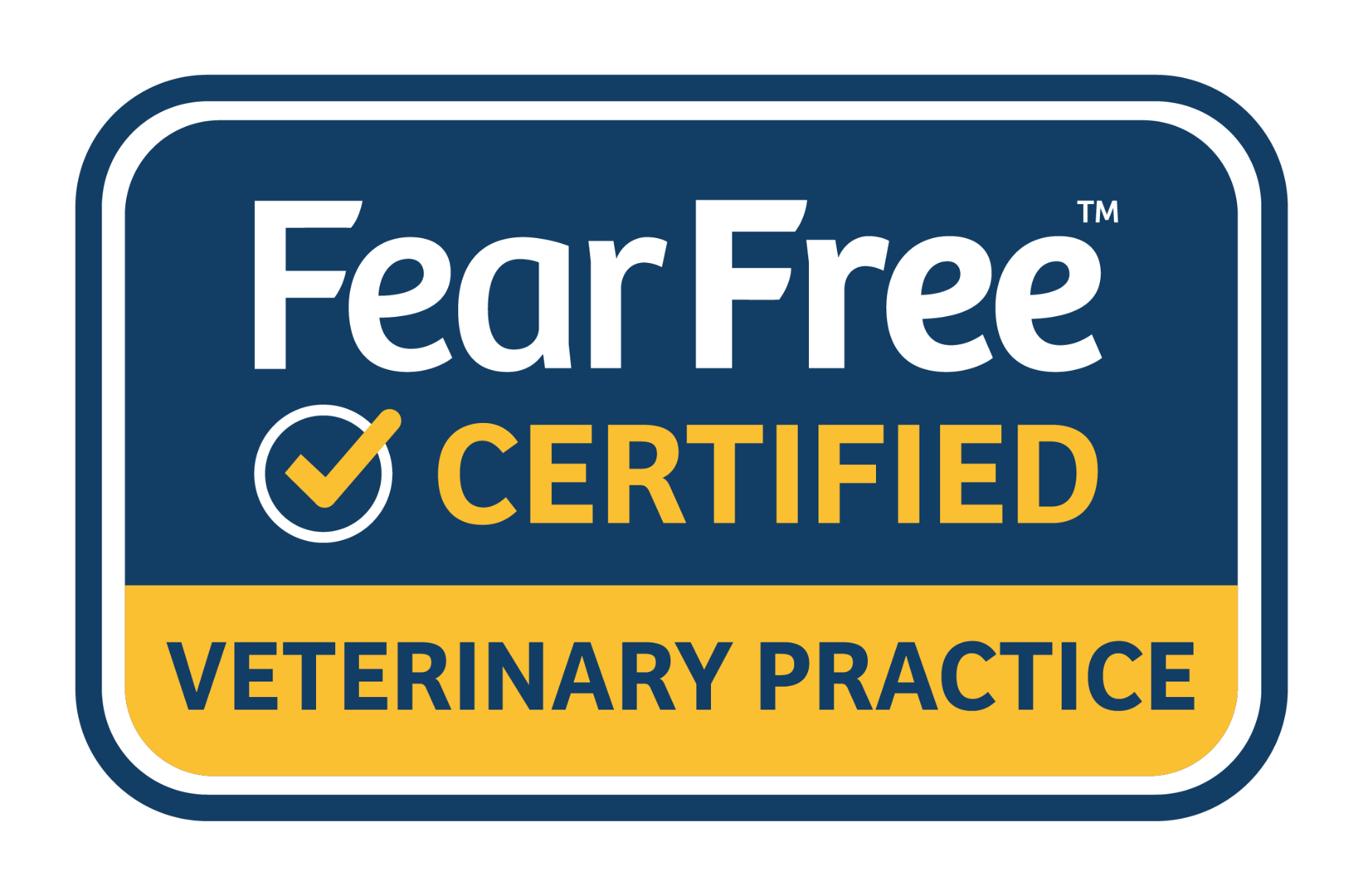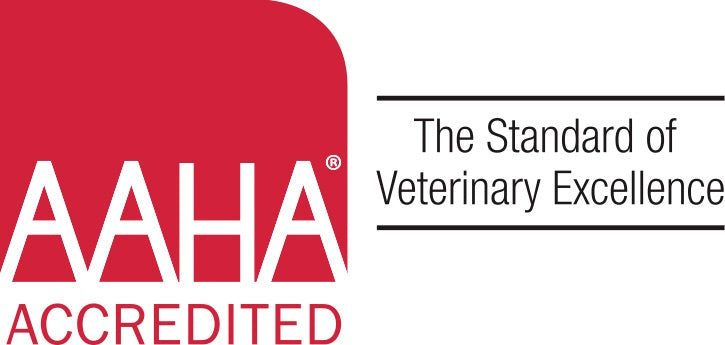

Your Pet Comes First
With a high degree of integrity, Trenton Pet Hospital’s leadership-style approach to preventative medicine has solidified our position as an adaptable, resilient and innovative small business within the Quinte area.
Our adaptability during challenging times, along with a sense of humour, create not only an incredible place to work, but welcoming, empathetic place for clients to visit.
Trenton Pet Hosptial is a Fear Free Certified, AAHA accredited, privately owned hospital, offering a variety of services to care for your pet including diagnostics, surgery, dental cleaning, nutritional consultions and more.
Click the + to expand each section below.
Early Detection Bloodwork
Even pets that appear completely healthy can have hidden health problems. Left undetected, these problems can lead into serious, even life-threatening conditions.
Blood tests are essential tools for identifying diseases at the earliest stage possible, when they are the most treatable.
Your veterinarian may recommend blood tests to:
- Screen your pet for potential developing problems so they can be treated before they become serious
- Make sure your pet is healthy enough to take certain medications, particularly if there is an underlying problem, such as kidney or liver disease
- Establish a baseline picture of what represents good health for your individual pet
Q&A
Why does my young dog need early detection bloodwork?
When basic laboratory testing is done as part of your pet’s annual examination, those values are recorded. Your veterinarian can review your pet’s health record at each subsequent exam, and spot any abnormalities or trends sooner, often before serious disease can develop.
What’s involved in a routine Early Detection Bloodwork?
The routine early detection bloodwork includes a complete blood count, biochemical profile, electrolytes, heartworm, ehrlichia, anaplasmosis and lyme diseases (tick borne diseases) tests evaluating kidney and liver functions, ruling out anemia and certain types of cancer. That’s a total of over 20 tests.
What’s involved in a senior Early Detection Bloodwork?
The senior wellness profile includes everything above as well as thyroid screening but in much greater detail. The total number of tests are over 40.
What does a blood test look for?
Standard blood test panels for dogs and cats routinely check for many types of problems.
Some common blood tests include:
A Complete Blood Count (CBC) – provides important information about the types and numbers of blood cells in your pet’s blood. A low number of red blood cells, for example, indicates anemia, while a high number of white blood cells can indicate an infection, chronic inflammation, or other disease process.
A Blood Chemistry Profile – particularly important for evaluating organ function (e.g. liver, kidneys), electrolytes, blood sugar, screening for clues that an endocrine disorder may be present, etc. Any abnormalities will help direct your pet’s veterinarian on any further diagnostic tests that may be necessary.
A T4 – measures the level of a thyroid hormone and helps to screen for hypothyroidism (low) and hyperthyroidism (too high) diseases
A Heartworm Test – which can detect evidence of heartworm disease.
An Ehrlichia Test – which can detect this potentially fatal disease, transmitted by ticks
A Lyme Disease Test – detects another potentially disastrous disease, transmitted by ticks
A vital tool for screening out disease
When pets are sick, they can’t tell us what’s wrong. That is where laboratory testing comes into play.
The importance of blood tests
Blood tests can be used to detect, treat and prevent potentially dangerous illnesses.
Sick or older animals often have more than once disease process affecting them at the same time, complicating diagnosis and treatment. Blood tests can help pinpoint specific problems.
In addition, some medications can be harmful if your pet has certain underlying problems, such as kidney or liver disease. In such cases, your veterinarian may order blood tests to make sure your pet is healthy enough to take the medication.
Finally, even in young and healthy pets, laboratory testing helps your veterinarian establish a baseline picture of what represents god health for your individual pet.
Blood tests are recommended as part of your pet’s annual physical examination.
Before anesthesia is administered, as an essential part of patient evaluation in preparation for a medical procedure or surgery. Your veterinarian will decide which tests are most important to run.
As part of your pet’s annual physical examination, both to spot problems as early as possible and to develop a baseline picture of your pet’s health.
If your veterinarian suspects a health problem and needs additional information to make an accurate or complete diagnosis.
Whenever your veterinarian recommends medications for your pet that might be contraindicated if he or she has certain underlying diseases.
How blood samples are collected
Your veterinarian or a registered veterinary technician can usually collect any needed blood samples during an office visit.
In some cases, however, blood samples need to be drawn at specific times over an extended period. Your pet may need to be kept at the hospital for a few hours or, in certain circumstances, overnight.
Surgery
We believe in utilizing the highest level of medical technology, and Dr. Jinni is experienced and highly trained. We also realize that it can be stressful to have your pet undergo surgery. We want to assure you that your pet is in good hands, and that we will do everything to provide the best care possible. We will communicate with you about the things you need to know before, during, and after your pet’s surgery. It is our goal to make the entire process go smoothly, and to eliminate the stress and worry of surgical procedures.
Pharmacy
We offer a fully stocked pharmacy to fill your pet’s prescription needs. Having an on-site pharmacy provides you with a more convenient way to get your pet’s medication. We hope that this will save you time and ultimately enhance your experience with us.
Diagnostics
Our hospital provides a wide variety of in-house diagnostic testing with the most state of the art technology available. It is our goal to provide your pet with the highest level of care possible, and our diagnostic tools help us do that.
Exams and Consultations
Our team will get a chance to meet with you and your pet to discuss their overall health. We will also go over diet, preventative medicine, and exercise to ensure that your pet is as healthy as possible. Then, Dr. Jinni will do a complete physical examination on your pet. It is always good to have a baseline in case your pet ever becomes ill. We also want to monitor your pet’s weight, ensuring that your pet stays a healthy weight. It is much easier to start a diet when a pet is a pound overweight instead of fifteen! Dr. Jinni will also look for any potential problems. Our goal is to catch any problems before they become major ones. The sooner that we are able to catch a problem, the easier it is to treat it and the more likely that your pet will make a full recovery!
Nutritional Counseling
Obesity is a common problem among pets, as it can be easy to over-feed a pet that knows how to beg. But being overweight is a serious problem for animals, and can cause real health problems as they get older. With proper diet and exercise, all pets should be able to meet their dietary needs and be within a healthy weight range.
Pets’ nutritional needs change as they enter different stages of their lives. The best way to make sure your pet’s needs are being met is to consult with us about a diet made specifically for his or her lifestyle.
Preventive Medicine
Regular checkups allow us to establish a baseline in your pet’s health and make us aware of any changes that may indicate future problems. We highly recommend bringing your pet in for regular exams. Often times health problems that go undetected can become more serious issues when left untreated, so checkups are important even when your pet appears healthy.
Retail Services
When you visit our hospital, be sure to browse our retail section.
Trenton Pet Hospital has a variety of nutritional products available for your pet. These include foods and healthy snacks that offer specific nutritional and medical needs. Our team will help you to choose a diet that is best suited for your pet.
In addition to our pet foods, we feature the latest in flea, tick and heartworm preventatives, dental care products, and Fear Free supplies - also available in our online store.
Vaccinations
There are a variety of diseases which affect our pets and other animals. This makes proper vaccination vital in protecting them from the many types of illnesses they are susceptible to. It’s important to consult with us about the unique risks of living in our region. We will be happy to discuss the benefits of protecting your pet with vaccinations, as well as, provide you with information on the required vaccinations for your pet.
What we are vaccinating our cats against?
Feline Panleukopenia Virus (Distemper in cats) – this is a highly contagious viral disease. It is similar to canine Parvovirus in both virus conformation and clinical signs. This organism is wide-spreadin the environment, where it can survive for more than a year.
Rhinotracheitis – This herpes virus is one of the major causes of infectious upper respiratory disease in cats. Clinical signs of felineupper respiratory disease include lack of appetite, lethargy, oculonasal discharge, sneezing, and fever.
Calicivirus – Clinical signs of this virus are often indistinguishable from Rhinotracheitis, except cats with this virus frequently have ulcerations in their mouth.
Feline Leukemia Virus (FELV) – FELV is a fatal retrovirus transmitted from mother to kittens across the placenta and through nursing, or from cat to cat primarily through the saliva. We recommend blood testing of all new kittens prior to vaccination and especially before introducing them to other cats in your household.
What we are vaccinating our dogs against?
Canine Parvovirus – This highly contagious disease causes severe bloody vomiting and diarrhea. Death may occur from dehydration and secondary complications
Canine Distemper – A highly contagious viral disease, this is primarily spread through direct contact. Clinical signs are usually associated with respiratory, gastrointestinal and central nervous system.
Adenovirus – This virus is associated with respiratory disease and infectious hepatitis (liver disease) in dogs
Leptospirosis – This organism is common in our area. Clinical signs can progress to severe kidney and often liver failure. This disease is transmissible to people through the urine of an infected pet.
Canine Coronavirus – This virus commonly affects the gastrointestinal system of puppies causing vomiting and diarrhea, but is not usually life-threatening.
Bordetella/Adenovirus Type 2/Parainfluenza – Kennel cough Complex: a collection of highly contagious bacteria and viruses that cause respiratory disease. We vaccinate through intranasal inhalation so that local immunity is high in the nasal passages, where the infection begins. For dogs at high risk of exposure (boarding frequently, regular groomings, showing, etc) we recommend vaccination every 6 months.

What is Fear Free?
Founded by “America’s Veterinarian,” Dr. Marty Becker, and developed by hundreds of experts in behavior, medicine, and handling, Fear Free has become one of the single most transformative initiatives in the history of companion animal practice.
The programs and courses provide veterinary professionals, pet professionals, animal welfare communities, and pet owners with the knowledge and tools to look after both a pet’s physical and emotional wellbeing.

What is AAHA Accreditation?
Trenton Pet Hospital has earned AAHA accreditation, a mark of veterinary excellence after a thorough review of patient care, protocols, equipment, and client service. Unlike human hospitals, animal hospitals are not required to be accredited. AAHA-accredited hospitals meet over 900 quality standards, exceeding basic regulations in areas like patient care, pain management, staff training, and diagnostics. These hospitals are recognized for leading-edge veterinary care and expert service. Pet owners trust AAHA-accredited hospitals for their pet's health. To maintain accreditation, hospitals are regularly reevaluated by AAHA.

Trupanion Certified Hospital
Signifying a commitment to excellence at every step, Trupanion's Certified Hospital designation is more than just a badge — it underscores our team's dedication to pet health advocacy and fostering responsible pet ownership.


